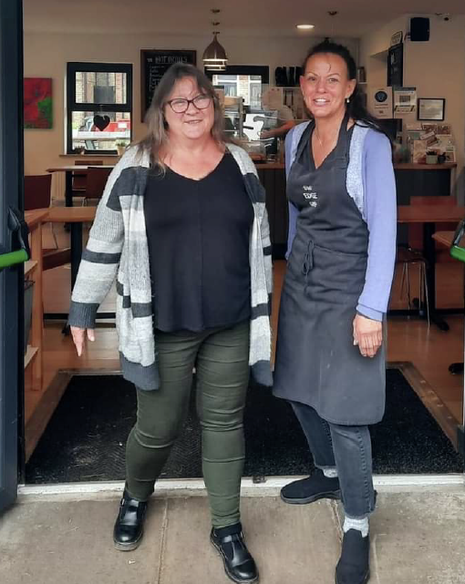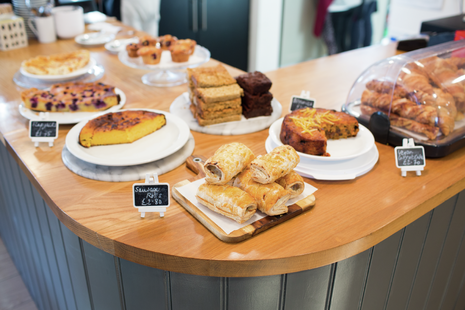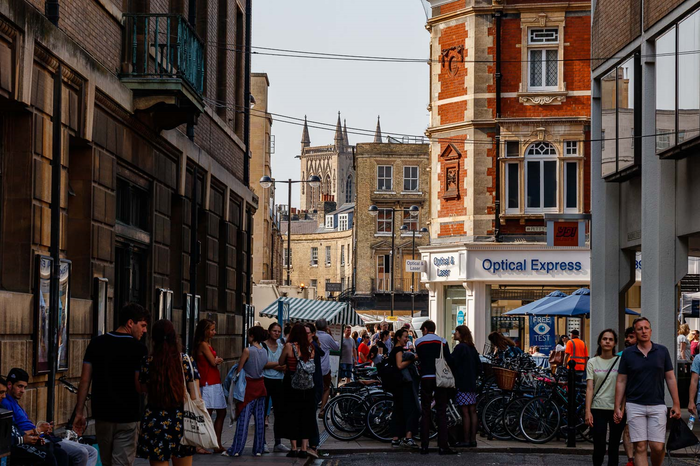The Edge Café: On Working at Cambridge’s Unique Café and Recovery Hub
Gail Sawyer & Sarah Dickinson speak to Chloé Gommichon about creating a productive space for those in the Cambridge community recovering from substance misuse and mental illness

Content Note: This article contains references to addiction and mental illness.
“I am so privileged to be working in this kind of environment every day. It’s a match made in heaven. I just love the fact that we have put together this place where we really try to help anyone who walks through that door,” Sarah Dickinson tells me, as I ask her about her experience as the manager of The Edge Café on Mill Road. The Edge – a vibrant social hub supporting people recovering from substance misuse and/or mental illnesses for the past four years – is a truly unique place that the Cambridge community is fortunate to have. Gail Sawyer, who amongst many other things, has worked with disenfranchised women, women who have had their children removed, and the Cambridge City Council, has been the recovery hub manager since 2018. For her, “The Edge combines everything I am passionate about – I am passionate about recovery and about food. It’s allowed me to be really open and honest about myself and to support other people. They always say you have to be quite selfish in recovery because you have to put yourself first and yes, absolutely, I put myself first, but I’ve now discovered that what really helps me is helping others.”
Unlike many other cafés in Cambridge, The Edge is a social enterprise with a distinctive purpose. Its salaried staff and volunteers are all simultaneously on their own recovery journey and work to provide a safe and warm environment for people seeking support with their recovery. When the staff are not busy making fresh coffee, hearty breakfasts, and homemade bakes, they organise relaxing and therapeutic activities such as a weekly support group, writing sessions, arts and crafts and Tai Chi. Both Gail and Sarah – who have themselves been in recovery for 19 and 6 years respectively – emphasised at great lengths that when recovering, maintaining stability with mental health and consistently engaging in social activities is far from being an obvious task. This is precisely why The Edge relentlessly works to make it known to others that there is a life after addiction.
“They always say you have to be quite selfish in recovery because you have to put yourself first and yes, absolutely, I put myself first, but I’ve now discovered that what really helps me is helping others”
When discussing how people in recovery can find purpose and build confidence by volunteering at The Edge, Sarah explains: “It’s majorly therapeutic. It’s something that is routine and that also allows this kind of meditation. It’s real life, so for [the volunteers], it’s a bit like playing something, but there’s a real customer, a real person drinking the coffee. I’ve had people who are terrified of speaking but who then end up being able to take a coffee order. They get the confidence because, […] we’re capable human beings, but when we end up being so dependent, we have no self-confidence or self-worth. I mean, it’s quite something to have to have a bottle of something to get through your day and then not have that and try and cope.” The truth is, there truly is a light at the end of the tunnel – Gail and Sarah are the living proof of it – along with the many volunteers who have been involved with Café and its recovery program and then gone on to find stable jobs.
Throughout our conversation, I am particularly trying to understand what makes The Edge different from other support services available for people in recovery. For Gail and Sarah, the answer is clear – it allows a connection that enables you to survive each day together, one at a time. It seems that The Edge has established a great form of complementarity with other services provided by GPs for instance, as Gail remarks: “We definitely enhance the [treatment] services because I know that they’re only funded to do a certain amount of intervention work with people, but we’re there for the long haul at the sustained recovery going forward.”
"We were drinking off the bloody chart. You don’t ask an alcoholic how many units they’re drinking!”
Both Gail and Sarah acknowledge that having a place like The Edge when coming out of treatment would have been an immense relief for them. Sarah goes more in-depth regarding her own experience and says, “actually, once with one of these providers, it was Inclusion or Drink Sense [two treatment services]– they were all as bad as each other. I was joined to all of them, and I remember going and sitting in there thinking, ‘what is this?’ And they would talk about how many units we were drinking – we were drinking off the bloody chart. You don’t ask an alcoholic how many units they’re drinking!” Gail agrees and tells me that if The Edge was not currently around: “It would be a little bit greyer without us. It would be scarier.”
As we speak, I come to comprehend that being able to access a community that anchors people in recovery, and encourages them to build social stability, is perhaps what makes the biggest difference in sustaining long-term journeys to recovery. Total abstinence from drugs or alcohol is one thing, but recovery also involves an ongoing process of growth, self-change, and a realisation of your self-worth, which is what The Edge fully commits to promoting. Recovery is fundamentally a process rather than an endpoint and understanding that is crucial. In line with this, Sarah observes, “That’s a big thing for people who are in a structured treatment – the end. The end is really a massive barrier to recovery because what’s after that is so scary. You feel very much like you’re alone. And that’s why [The Edge] is there – to walk with people all the time.”

At times, a dominating theme of our conversation was the sentiments of isolation and alienation that one is faced with when leaving treatment and, in turn, how The Edge actively tries to remediate these feelings through its multiple support groups and activities. “When you come out of treatment, you’re dropped back into your home, everything’s the same but you’ve changed. They stripped you and built you back up but there’s no sort of understanding and that’s why we have our programs that we need to survive” Sarah remarks. Gail concurs and says “It’s about answering questions, isn’t it? It’s about addressing the fears people have about [recovery] and breaking down the barriers to access.”
Throughout the discussion, Gail and Sarah share heartwarming anecdotes of people who have thanked them for saving their lives. People who, instead of having a drink, picked up the phone and reached out to someone from their recovery group, and also others who have fallen off the ladder, gone to rehab or prison but came right back to The Edge once they could. These stories are telling of the power and impact The Edge has had when it comes to fostering feelings of connectedness and worthiness amongst the recovery community.
"At times, a dominating theme of our conversation was the sentiments of isolation and alienation that one is faced with when leaving treatment"
Considering that, as we are speaking, it is Mental Health Awareness Week and mental health provisions for students in Cambridge are often inadequate or difficult to access, I end by asking Gail and Sarah how the student population could benefit from The Edge: “There are no stigmas, it’s a café environment, you don’t have to say that you’re anything to join, you just come,” Gail acknowledges. I think here Gail touches on something that could resonate with Cambridge students currently seeking treatment or on their recovery journey – addiction or mental illness often comes with harmful stereotypes and finite descriptions, and it is these damaging judgments, often held by the media, peers, or even family, that instil a sense of fear within those struggling, making them reluctant to admit to their struggles and reach out for support.
Talking about what the face of addiction or mental illness can look like is unfortunately not a common practice here at Cambridge. Yet, it could be of immense relief for anyone to be aware of such support groups founded upon values of love, care, and inclusivity like The Edge Café. As Sarah wonderfully concludes: “You can fall, and The Edge is always there for you. It’s waiting there for you, and I’d really like to stress that to people. We’re here with open arms, there’s no shame.”
 Features / Should I stay or should I go? Cambridge students and alumni reflect on how their memories stay with them15 December 2025
Features / Should I stay or should I go? Cambridge students and alumni reflect on how their memories stay with them15 December 2025 News / Cambridge study finds students learn better with notes than AI13 December 2025
News / Cambridge study finds students learn better with notes than AI13 December 2025 News / Dons warn PM about Vet School closure16 December 2025
News / Dons warn PM about Vet School closure16 December 2025 News / News In Brief: Michaelmas marriages, monogamous mammals, and messaging manipulation15 December 2025
News / News In Brief: Michaelmas marriages, monogamous mammals, and messaging manipulation15 December 2025 Comment / The magic of an eight-week term15 December 2025
Comment / The magic of an eight-week term15 December 2025









